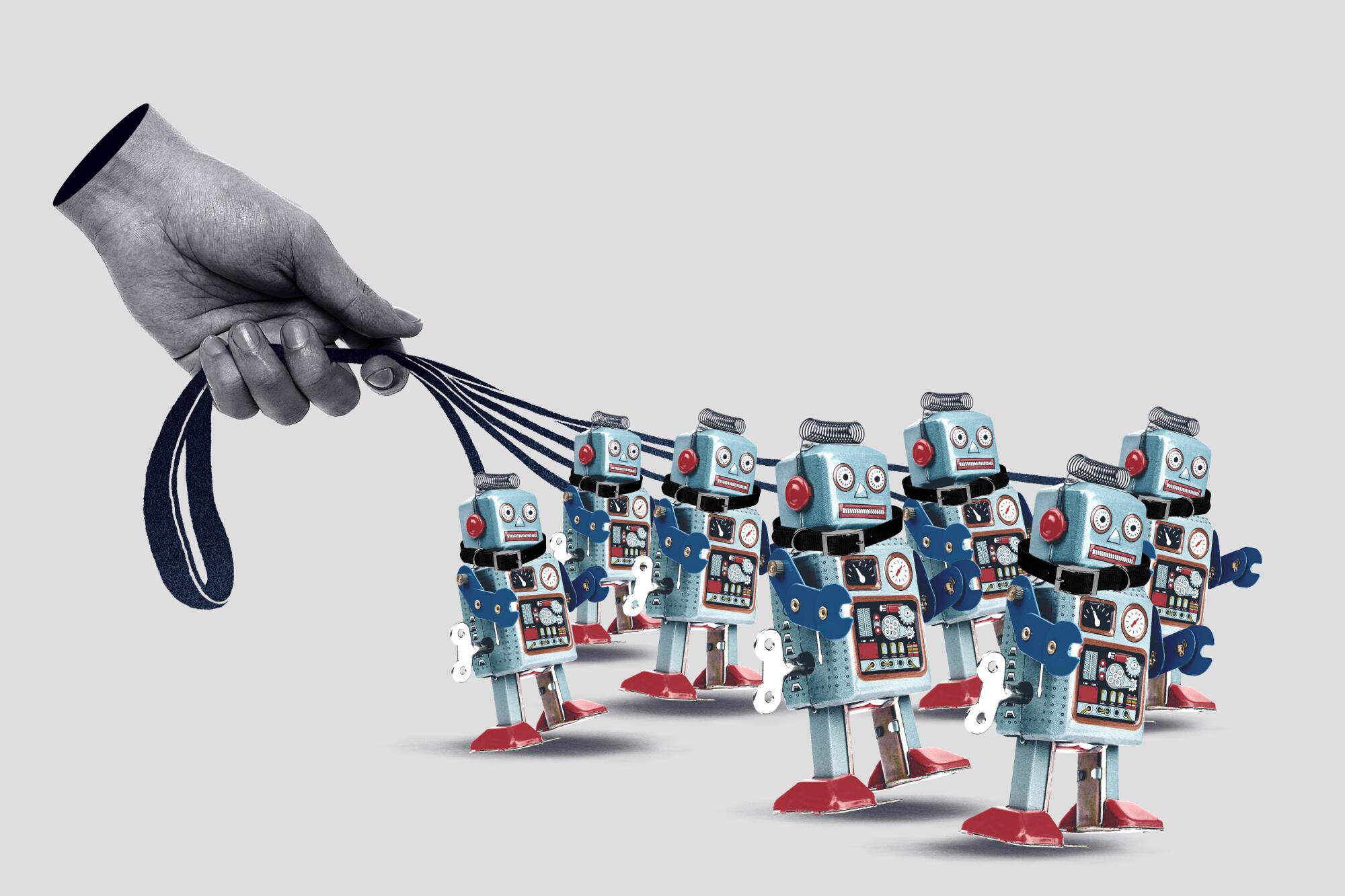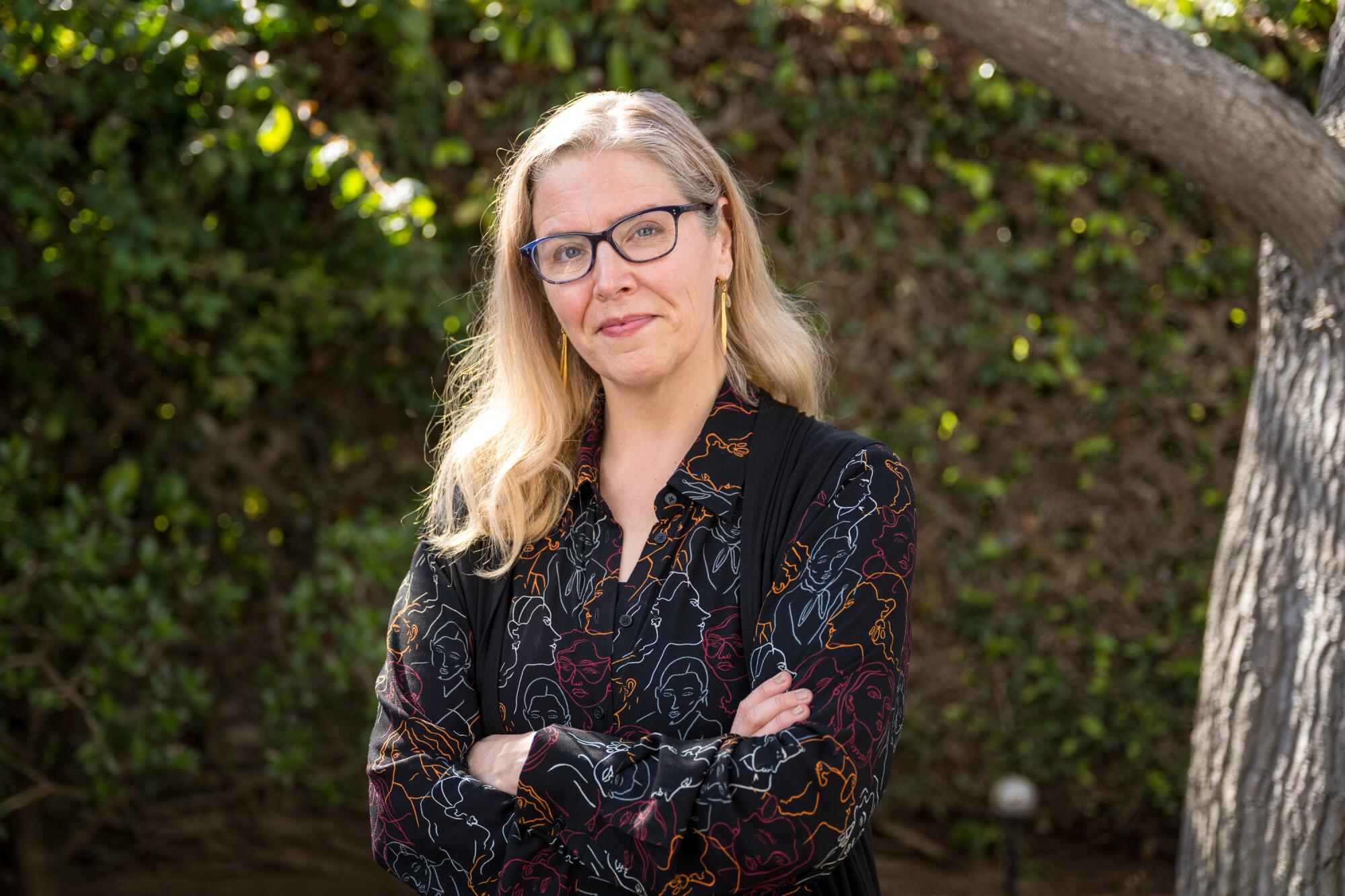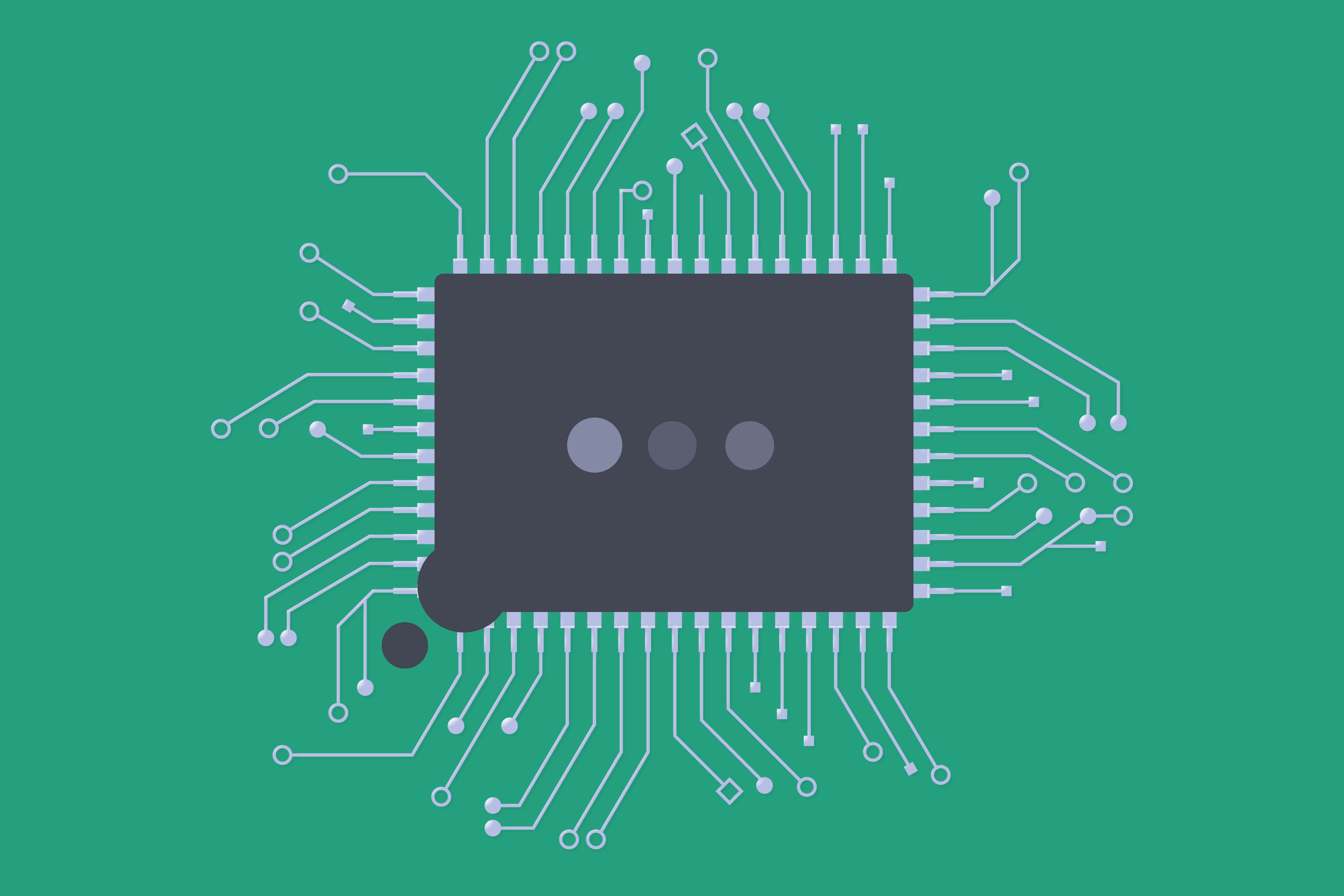
For the thousands of tech workers recently laid off in California and across the country, the future may not be as bleak as it looks right now: Many are likely to retrain fairly quickly for new jobs in the burgeoning field of artificial intelligence.
The massive rounds of layoffs at tech giants and many smaller companies were largely the result of stricter investor demands — what managers saw as over-hiring during the pandemic and a stock market that rewarded those personnel cuts.
But the industry also was clearing the way to focus on AI, which is expected to revolutionize computer-related technology and work in the years ahead — even as it displaces jobs, previously handled by humans, in areas as varied as coding and background acting.
Not only is AI taking over more standard computer programming once done entirely by humans, it is also starting to spur waves of new applications — and with them, jobs, both tech and non-tech, in a wide range of industries, including in Southern California.

“What we’re seeing is a lot of tech companies are actually monetizing the AI solution,” said Jenn Longnion, the Los Angeles-based founder of See & Free Consulting, which helps businesses grow sustainably. “They’ve had AI for a very long time. But they’re finding ways now to monetize that and actually promote that and sell that as a solution to other businesses. ... Every industry is now having those conversations.”
Job postings in the U.S. that specifically mention AI, though still a tiny fraction of all openings, were up by 13% in February from a year ago, even as software development was off more than 30%, according to the employment website Indeed.
Silicon Valley, where most of the AI action is today, figures to lead the way. In February, 9% of companies in the Bay Area said they already use AI, compared with a little more than 5% in the U.S. as a whole, according to the Census Bureau. The share of Los Angeles-area companies wasn’t significantly higher than the national average, but about 8% of firms in the Southland said they expected to adopt AI in the next six months. In Silicon Beach, which has emerged as a home for companies focusing on AI and augmented reality, firms are hiring for hundreds of AI-related jobs, including content writers and software developers who will train the technology.
Tom Case, a founder at Atticus Growth Partners, a tech recruiting firm in San Francisco, said the proliferation of AI entrepreneurs and startups translates into more jobs. In the last few years, companies have been hiring primarily for research labs, he said, but the industry is beginning to move from AI models to getting them into production.
“We’re in an almost gold rush where everybody’s building an AI company model,” he said. “Very little AI is deployed in production. ... At the moment, it feels like the dawn of job creation.”
After pivoting her startup from business operations software to customer service ticketing through AI, Sophie Wyne saw interest skyrocket.
“I actually have never seen this amount of interest before for a product,” said Wyne, founder and chief executive of Ariglad in San Francisco. “It’s really just combining two things which people are really caring about. One is AI — I think everyone’s really interested in how can that actually help my day-to-day in reality and not be so abstract. And the other side is, I just hate updating my knowledge base.”
Among the hundreds of AI startups looking for talent is Quest Labs, a Bay Area firm co-founded by Debparna Pratiher. The 27-year-old previously worked as a product manager at Nvidia, the highly publicized Silicon Valley supplier of chips used in gaming and other high-performance computing, particularly AI.
Pratiher is an alumnus of UC Davis and Carnegie Mellon University. Her firm, with seed money from Techstars and Afore Capital, has a staff of about 20. The business has been moving quickly to build data sets for ecommerce as Google has started to phase out third-party cookies, which track and learn what users are doing online. “If cookies are gone, you’re blind to consumers,” Pratiher said.
She said she’s had difficulty finding qualified data scientists and other AI engineers with deep experience in machine learning.
“For all the AI hype and interest, buyers need to adopt the technology, and for that, they need better data,” Pratiher said.
For those recently laid off, getting up to speed on Python, the popular programming language, and other in-demand AI skills isn’t as daunting as one might think. Some skills, such as learning programming languages and databases to build AI models, might take a matter of weeks for IT workers.
Phrases such as “Great Resignation,” “quiet quitting” and “coffee badging” have taken the internet by storm. But the terms also show workers trying to exert power.
Even those with little or no experience in tech have been able to pivot.
Shakil Kamran attended a Salesforce conference in 2017, set on trying to break into tech and transition out of his retail management career, which regularly involved 60-hour weeks and left little time to spend with his son.

He took courses through Trailhead, San Francisco-based Salesforce’s online learning platform, increased his skills and began seeing AI as the future. Today, Kamran, 37, is a Salesforce consultant and focuses on helping organizations use AI to help their business grow.
“AI is going to help us. It’s going to assist us in growing and becoming more effective and efficient,” said Kamran, who lives in Connecticut. “It’s going to supercharge our lives.”
Others are following Kamran’s lead. Trailhead expanded its AI curriculum last year to include 43 “badges” that are earned by completing courses. So far, users have tallied more than 1.1 million badges, said Ann Weeby, senior vice president of Trailhead.
“We’re seeing employees from every level, in every type of business ... jump in and start learning, because they want to apply generative AI to their business yesterday,” Weeby said.
Batten down the hatches: We’re facing “economic headwinds.” Why are so many corporate leaders suddenly using this euphemism when announcing layoffs?
For their part, many universities are pivoting to incorporate AI in courses on computer science and other disciplines.
“It’s not a death knell,” said Charles Lee Isbell Jr., who studied at MIT’s AI Lab and recently became provost at the University of Wisconsin in Madison.
Isbell is pushing for classroom emphasis on AI data-driven simulations and so-called deep learning, which uses multiple layers of what are called “artificial neural networks” — complex algorithms designed to mimic the human brain to generate new data.
“Coding and programming aren’t going away,” he said.
The Times spoke to Nicole Brown of TriStar Pictures; Sam Register of Warner Bros. Animation; Jonathan Glickman of Panoramic Media Co.; Roy Lee of Vertigo Entertainment; FredAnthony Smith of SMAC Entertainment and Chris Hart of United Talent Agency
Tech layoffs have slowed from last year’s frenetic pace, but they remain substantial. More than 28,000 job cuts by tech firms nationwide were announced in the first two months of this year, according to Challenger, Gray & Christmas, an outplacement and research firm.
Only a few hundred of those layoffs were explicitly attributed to AI, but thousands more cuts in tech and other industries were said to be the result of “updating or incorporating new technology,” Challenger said. It noted that some of that may be companies overhauling budgets and staffing to make room for AI work.
Although AI may not be directly responsible for most of the tech sector’s job cuts, companies are realizing that greater utilization of AI could mean they don’t have to rehire for some positions, or that they can transition parts of those jobs over to the new technology, said Longnion of See & Free Consulting.
Background actors expressed fears during last summer’s strike that AI technology would be used to replace their jobs. Their new contract secured rules to guard against that.
Data from Layoffs.fyi show that a growing number of layoffs have hit software developers, also known as coders, who — after decades of disrupting other industries and other workers’ jobs with their programs — find themselves victims.
In recent months, hundreds of coders and other IT specialists have been let go by tech giants Google, Meta and Apple, as well as many smaller industry-focused digital platforms and cloud services, including Toast (restaurants), Flexport (logistics) and Block (financial services).
Many of the layoffs have come in the Bay Area, putting a pause to two decades of growth at California’s computer-systems design firms and related services. Most of the cuts probably reflect a pullback after excessive pandemic-driven hiring, due in part to ecommerce and remote work.
But the correction may be ending soon, as new tech jobs come into view and workers adjust.
Ayanna Howard, a robotics expert and dean of the engineering college at Ohio State University, said it wasn’t long ago that coding was all the rage, and people were flocking to computer boot camps. She remembers how hard it once was for people to create a website. Now, with AI tools, you can build one within minutes by simply putting in blocks of information, she noted.
AI can also do coding on back-end servers, the side responsible for storing and organizing data, including security.
But Howard said not all is lost for even low-level coders.
“If you’re trained to learn, you can evolve,” she said, just as those who began by using Pascal and BASIC learned to program in Assembly and Python, used for many machine learning and AI solutions.

Others are emphasizing the inimitable human touch that AI could never replace. Since Alissa Marr was laid off last month from an early-stage AI startup, the product designer has mostly focused on building her business acumen and strategic problem-solving ability rather than just retooling her software skills.
“Those kinds of things are not something an AI can do,” said Marr, 39, who lives in Providence, R.I. “You need to have a human with expertise and knowledge about the customer and the business problem. There needs to be someone pulling the strings, because it can’t just be automated by AI and just go out as is.”
AI may ultimately lead to a smaller tech workforce, said Howard of Ohio State. But there will also be AI-augmented jobs, as well as new jobs. One position in high demand is prompt engineer, who designs prompts and other processes to get optimal performance from generative AI tools, whether text or images.
A company buying AI conversational programs such as ChatGPT (from OpenAI) or Gemini (from Google) will still need engineers to refine and customize the tools to replicate human-like dialogue suitable for its customers.
We interviewed ChatGPT, a chatbot that has garnered widespread attention for its ability to mimic human conversation. Then we brought in experts in artificial intelligence and the arts to analyze ChatGPT’s responses.
“We don’t necessarily know what it is that we need,” Howard said. “But they will come out, and when they do, it’ll be like, ‘Oh, guess what? It’s another field.’”
More to Read
Inside the business of entertainment
The Wide Shot brings you news, analysis and insights on everything from streaming wars to production — and what it all means for the future.
You may occasionally receive promotional content from the Los Angeles Times.
















